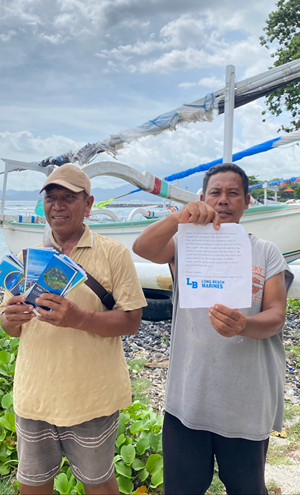A journey to Bali sounds like a dream trip: seeing the famous Blue Lagoon, checking out beautiful coral reefs, or taking a leisurely cruise down a river. But for Long Beach Classroom TA member Megan Grahlfs, what she saw on an education trip to the Indonesian island spurred her to action both in and out of the classroom.
Grahlfs, a marine science teacher at Long Beach High School, has worked with the Global Exploration for Educators Organization to go on research trips around the world, including Australia, the Galapagos Islands and Baha. Through these trips, she has studied reefs, marine biology and ecosystems and has brought that knowledge and those experiences back to her classroom to help enrich her students.
But it was a trip to Bali that sparked a new idea in her mind, one that would help her students broaden their horizons and make an impact on the world at large.
While studying marine life and the reefs in Bali, Grahlfs noticed a major issue with plastic pollution around the Blue Lagoon, and then saw several fires lit by the riverbank while on a river rafting expedition. After seeing a lot of trash in the river as well, she asked her tour guide what the fires were. He told her they were burning trash to get rid of it. Bali, which relies on tourism, cannot keep up with the amount of plastic waste from packaging and tourists that visit the island.
At lunch Grahlfs spoke more with her tour guide while brainstorming lesson plans. While they had been out at the Blue Lagoon, she noticed that the fishing boats that transported them did not contain any information on the ecological treasure. Her guide thought it would help with the tourist industry to have information on the lagoon itself, the ecology and environment, and the impact trash can have on local wildlife.
 Ideas in mind, Grahlfs brought the lessons back to her class. She said her students were excited to have a real-life application to what they were studying in class and took to the assignment like fish to water. “I think Jacques Cousteau said it best: what you love is what you protect,” said Grahlfs. “If you understand your impact on a global scale, you’re going to protect it more.”
Ideas in mind, Grahlfs brought the lessons back to her class. She said her students were excited to have a real-life application to what they were studying in class and took to the assignment like fish to water. “I think Jacques Cousteau said it best: what you love is what you protect,” said Grahlfs. “If you understand your impact on a global scale, you’re going to protect it more.”
Students began doing reef surveys like scientists would do and then took the time to identify the species inhabiting those reefs. They researched the impacts of plastics on the environment and on those species and then made and printed the brochures, which were sent over to Bali at the end of 2023.
“This was something tangible, something to show our students that they can have an impact,” said Grahlfs. “It allowed them to take ownership of their passions and make an impact on a local scale.”
Enough brochures were printed and laminated to make sure that each of the six different boats that ferry tourists out to the lagoon had them. This allows the boat captains to be able to provide tourists with information while on the boats and make a dent in the amount of trash on the island and the surrounding waters.
“Hopefully there will be this trickle-down effect and they can help globally with this project,” Grahlfs said. “What we’re doing here can affect what is happening across the world.”
Related resources:
https://geeo.org/educator-resources/